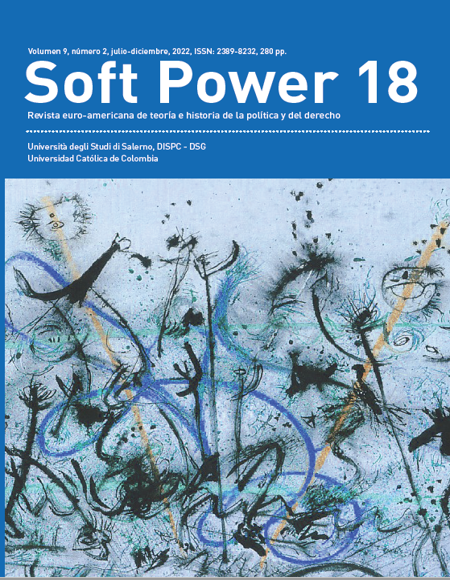
Esta obra está bajo una licencia internacional Creative Commons Atribución-NoComercial 4.0.
Al enviar los artículos para su evaluación, los autores aceptan que transfieren los derechos de publicación a Soft Power. Revista Soft Power para su publicación en cualquier medio. Con el fin de aumentar su visibilidad, los documentos se envían a bases de datos y sistemas de indización, así mismo pueden ser consultados en la página web de la Revista.Resumen
A partir de la década de 1990, la teoría de la globalización ha descartado rutinariamente el Estado-nación como irrelevante para comprender el desarrollo político y económico contemporáneo. Así, una serie de libros y artículos han defendido la crisis del Estado-nación, la retirada del Estado e incluso el fin del Estado-nación. En cambio, este artículo considera la relación entre la teoría de la globalización y la teoría del Estado para argumentar que los Estados-nación son los principales agentes de la globalización, así como los garantes de las condiciones políticas y materiales necesarias para la acumulación de capital global. Este texto argumenta que la teoría de la globalización ha construido una antinomia distorsionada, que ignora desarrollos significativos en la teoría estatal neomarxista. Para comprender el proceso de globalización, es importante reconocer que el Estado está siempre presente dentro de las relaciones sociales de producción. De esta manera, es posible entender que el nuevo sistema globalizado de acumulación de capital ha resultado en una asimetría cada vez mayor entre la respuesta del Estado a las demandas de políticas que faciliten la acumulación de capital frente a las políticas que sustentan su legitimidad democrática. Esta asimetría está generando cada vez más formas de Estados nacionales que son “Estados fortaleza” propensos a utilizar medidas represivas para proteger la acumulación de capital contra las demandas populares democráticas de regulaciones protectoras y de provisión de bienestar social
Palabras clave

Citas
Aglietta, M. (2000). A Theory of Capitalist Regulation: The U.S. Experience. London:
Verso.
Altvater, E. (1973a). Notes on Some Problems of State Interventionism (I). Kapitalistate
(1), 97-108.
Altvater, E. (1973b). Note on Some Problems of State Interventionism (II). Kapitalistate
(2), 76-83.
Barrow, C.W. (2005), The Return of the State: Globalization, State Theory, and the New
Imperialism. New Political Science, 27: 2, 123-145.
Barrow, C.W. (2016). Toward a Critical Theory of the State: The Poulantzas-Miliband
Debate After Globalization, Albany, New York: Suny Press.
Barrow, C.W. (2019). Marxist Political Theory, Diversity of Tactics, and the Doctrine of
the Long Civil War. New Political Science, 41: 4, 622-653.
Barrow, C.W., and Keck, M. (2017). Symposium/State-Globalization Theory and State
Theory: The False Antinomy. Studies in Political Economy, 98:2, 1-20.
Brewer, A. (1990). Marxist Theories of Imperialism: A Critical Survey. New York: Routledge.
Castells, M. (1997). The Information Age: Economy, Society, and Culture, Oxford: Blackwell.
Cleaver, H. (1979). Reading Capital Politically. Autin, Texas University Press.
De Bernis, G.D. (1990). On a Marxist Theory of Regulation. Monthly Review, 41: 8, 28-37.
Farber, S. (2018). Donald Trump, Lumpen Capitalist. Jacobin Magazin (October 19).
https://www.jacobinmag.com/2018/10/donald-trump-lumpen-capitalist-class-elections
Fukuyama, F. (1992). The End of History and the Last Man. New York: The Free Press.
Gill, S., and Law, D. (1988). The Global Political Economy: Perspectives, Problems, and
Policies. Baltimore: Johns Hopkins University Press.
Hardt, M., and Negri, A. (2000). Empire. Cambridge (Mass.): Harvard University Press.
Konings, M. (2010). Renewing State Theory. Politics. 30:3, 174-182.
Marx, K. (1977). Capital: A Critique of Political Economy. Vol. 1. New York: Vintage
Books.
O’Connor, J. (1973). The Fiscal Crisis of the State. New York: St. Martin’s Press.
Ohmae, K. (1990). The End of the National State. New York: Free Press.
Panitch, L. (1994). Globalization and the State. In R. Miliband and L. Panitch, eds., Socialist
Register 1994. London: The Merlin Press.
Panitch, L. (1996). Rethinking the Role of the State. In J. Mittelman (ed.), Globalization:
Critical Reflections. Boulder: Lynn Rienner.
Panitch, L., ed. (1977). The Canadian State: Political Economy and Politica Power, Toronto:
University of Toronto Press.
Panitch, L., and Gindin, S. (2018). Trumping the Empire. In L. Panitch and G. Albo,
eds., Socialist Register 2019. London: The Merlin Press.
Poggi, G. (1990). The State. Its Nature, Development, and Prospects. Stanford: Stanford
University Press.
Poulantzas, N. (1974). Fascism and Dictatorship. London: Verso.
Poulantzas, N. (1976). Crisis od Dictatorship. London: Verso.
Poulantzas, N. (2008). The Poulantzas Reader: Marxism, Law, and the State. London and
New York: Verso.
Robinson, W.I, and, Harris, J. (2000), Towards a Global Ruling Class: Globalization and
the Transnational Capitalist Class. Science & Society, 64: 1, 11-54.
Shaw, M. (2000). Theory of the Global State: Globality as Unfinished Revolution. Cambridge
(Mass.): Cambridge University Press.
Steger, M.B, and Wahlrab, A. (2017). What Is Global Studies? Theory and Practice. New
York: Routledge.
Strange, Susan (1996). The Retreat of the State: The Diffusion of Power in the World Economy.
New York: Cambridge University Press.
United Nations (2020). Growth in United Nations Membership, 1945-Present. https://
www.un.org/en/sections/member-states/growth-united-nations-membership-
-present/index.html
Wriston, W. (1992). Twilight of Souvereignty: How the Information Revolution Is Transforming
the World. New York: Scribner’s.










